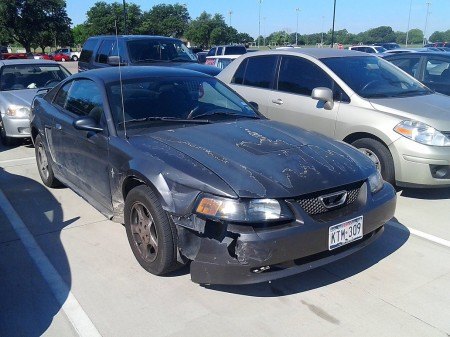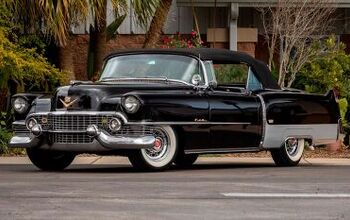Hammer Time: Carfax, Red Flags, And Rolling Turds
Steve,
You often write about the importance of evaluating a car’s history before purchasing it. We all have access to Carfax and Autocheck reports, but what are some things on those reports that trigger your red flag?
Here are five red flags that always give me a sense of caution whenever investigating the history of a vehicle.
1. Short ownership history
If I see that a vehicle has been most recently owned for less than 18 months, I give it a big fat negative.
This is in part due to the fact that I have only a limited time period to inspect vehicles at the dealer auctions I attend. At most auto auctions you will have between 100 to 5000 vehicles available on a given day. So you have to pare down your list of potential purchases, and refine it by developing a criteria that works.
Sometimes a short ownership period simply reflects an unwanted family hand me down. But the overwhelming majority of the time, these short-term keepers will be traded in with a chronic problem or three that will take $$$ to solve. I don’t want my money to sit in a repair shop. So I avoid the risk that comes with purchasing a vehicle that likely didn’t make the prior owner happy.
2. Too many years in a region where rust issues are predominant.
There is a wide swath of the USA, from the northern Midwest all the way up to Maine, that is particularly heinous when it comes to rust. Nobody in the South knows how to treat body rust and due to the related electrical issues, I try to avoid these models whenever possible.
3. Too many accidents
I can deal with one or two. However once you get to the four to six accident level, you are either dealing with an abusive driver or a neglectful owner. Sometimes both. I avoid those cars.
4. Several recent dealer visits for an expensive issue
A listing that shows ‘transmission inspected’, followed by ‘transmission fluid serviced’ in an older car will wind up creating a red flag as bright as the fluid. Engine issues, all-wheel-drive systems, and electrical issues will all raise a red flag of concern.
5. Too many registered liens
Here in the South, folks who are short of cash will pawn their vehicle. I can deal with one lien registered. But when I start seeing several of them over the course of years for a more expensive vehicle, I won’t bid on it unless I can confirm that the vehicle has been maintained reasonably well over that time.
Now here are five things I absolutely love to see on a Carfax or Autocheck history.
1. Dealer maintenance
I will pay anywhere from $800 to $2000 more for a vehicle that has been dealer maintained since day one. These cars are usually the most capable of holding the note, and the maintenance records you can give to your customers makes these vehicles an easy sale.
2. Location
Yes I do pay attention to where the vehicle has been registered over the years.
On average, a one owner car that has resided in an affluent area of town will be in better shape than one that has resided in an area infested with heavy traffic and crime. This isn’t an absolute, but a nice location usually offers a garage and a greater means to buy the maintenance services that the car needs.
3. Long-term ownership
A longer ownership period usually correlates to a vehicle in better overall mechanical condition; especially when it has been maintained at a dealership.
There are plenty of folks who will neglect maintenance and try to pass the buck to the next owner . When you have the fortune (and misfortune) to look at tens of thousands of vehicles a year, this variable tends to be pretty easy to figure out.
4. No liens
Cash purchases often times reflect an owner who has the means to take care of issues instead of an overwhelming need to try to ride them out.
5. Few to no accidents / moderate to minor damage
Substandard repairs can ruin a cars worth. If the vehicle has a severe accident history, I will only dig deeper if the vehicle represents something I would truly value for my lot. Conservative drivers tend to be conservative owners and, although Carfax and Autocheck offer extensive information, they don’t document everything.
If multiple accidents of moderate to severe damage have been recorded over the last few years, I will avoid that vehicle.
Finally let me offer you three surprises when it comes to Carfax and Autocheck histories.
1) A salvage history is not always a bad thing.
I use a seven year cutoff. If a car has been totaled within the first seven years of its life, I will usually drop it from my list of cars to buy.
However a lot of vehicles that have experienced minor damage will often be totaled out and then resold to a dealer at a salvage auction. I have purchased several older vehicles that were totaled without any form of frame damage or airbag deployment. The cost of repair was so high for body parts and minor components that the car was simply not worth fixing. Even though it ran perfectly fine.
Orphan brands are particularly good salvage buys if, and only if, you know what you are doing when it comes to inspecting the vehicle.
2) ‘The North’ is not always a bad thing.
It pays to know your geography and the potential affluence contained within it. Many northern cars are as rust free as their southern counterparts thanks to an indoor garage and minimal exposure to inclement weather and chemicals. Again, these vehicles are good buys only if you know how to properly inspect and appraise a given vehicle.
3) Failed emissions mean nothing, unless it is recent and you live in an area that requires it.
If a vehicle failed emissions a few years ago, I don’t care. Emission issues are often due to the catalytic converter and related sensors living out their useful lives. These can be replaced at a reasonable cost most of the time.
Still, in some areas of the USA, a recent emission issue can be expensive and tricky to fix. If you happen to live in an emissions county or state, pay close attention to the most recent emission inspections.
More by Steven Lang
Latest Car Reviews
Read moreLatest Product Reviews
Read moreRecent Comments
- MaintenanceCosts I wish more vehicles in our market would be at or under 70" wide. Narrowness makes everything easier in the city.
- El scotto They should be supping with a very, very long spoon.
- El scotto [list=1][*]Please make an EV that's not butt-ugly. Not Jaguar gorgeous but Buick handsome will do.[/*][*] For all the golf cart dudes: A Tesla S in Plaid mode will be the fastest ride you'll ever take.[/*][*]We have actual EV owners posting on here. Just calmly stated facts and real world experience. This always seems to bring out those who would argue math.[/*][/list=1]For some people an EV will never do, too far out in the country, taking trips where an EV will need recharged, etc. If you own a home and can charge overnight an EV makes perfect sense. You're refueling while you're sleeping.My condo association is allowing owners to install chargers. You have to pay all of the owners of the parking spaces the new electric service will cross. Suggested fee is 100$ and the one getting a charger pays all the legal and filing fees. I held out for a bottle of 30 year old single malt.Perhaps high end apartments will feature reserved parking spaces with chargers in the future. Until then non home owners are relying on public charge and one of my neighbors is in IT and he charges at work. It's call a perk.I don't see company owned delivery vehicles that are EV's. The USPS and the smiley boxes should be the 1st to do this. Nor are any of our mega car dealerships doing this and but of course advertising this fact.I think a great many of the EV haters haven't came to the self-actualization that no one really cares what you drive. I can respect and appreciate what you drive but if I was pushed to answer, no I really don't care what you drive. Before everyone goes into umbrage over my last sentence, I still like cars. Especially yours.I have heated tiles in my bathroom and my kitchen. The two places you're most likely to be barefoot. An EV may fall into to the one less thing to mess with for many people.Macallan for those who were wondering.
- EBFlex The way things look in the next 5-10 years no. There are no breakthroughs in battery technology coming, the charging infrastructure is essentially nonexistent, and the price of entry is still way too high.As soon as an EV can meet the bar set by ICE in range, refueling times, and price it will take off.
- Jalop1991 Way to bury the lead. "Toyota to offer two EVs in the states"!


































Comments
Join the conversation
Buy new! ,
As someone who has tries to keep cars for at least one year for every thousand dollars I spent buying it, (used to be 1y/$300, inflation has raised prices, and marriage has raised standards) I love seeing info to help with my infrequent buying experience. Having always lived in the rust belt, corrosion is something that scares me more then a salvage title. Unfortunately I have to disagree about garage kept cars in the north. Particularly heated garages, but any shelter that can raise the temp up to the point where the salty slush can melt, and any time it's above ~-5 a warm car parked out of the wind will do it, the now salty water runs INTO areas you can't easily inspect and rust suspension, frame, and any other hollow parts from the inside out. Admittedly it happens out in the open too, but the outdoor dwelling Accord I owned when I met my wife survived 2 years longer then the 2 year younger heated garage dwelling Accord my wife brought to our union. And I find it hard to believe that Hondas corrosion protection could get much worse between the 1st and 2nd generation design.